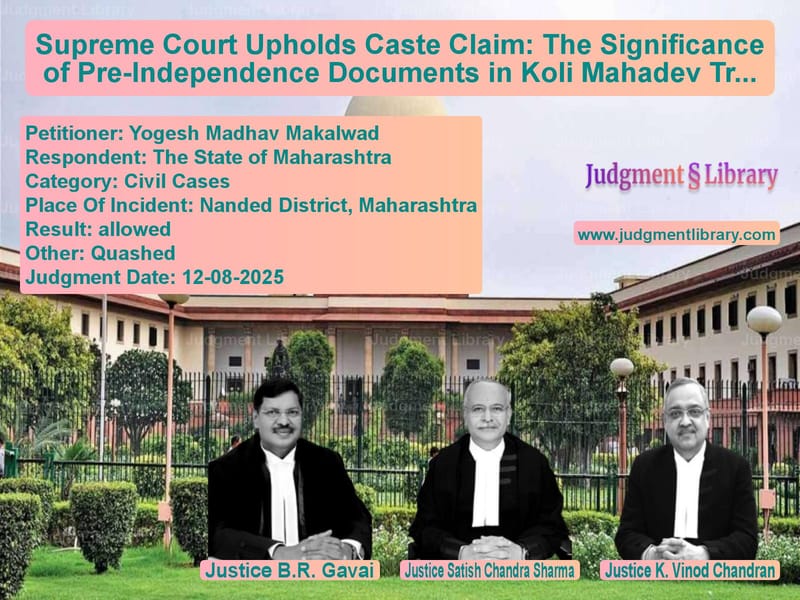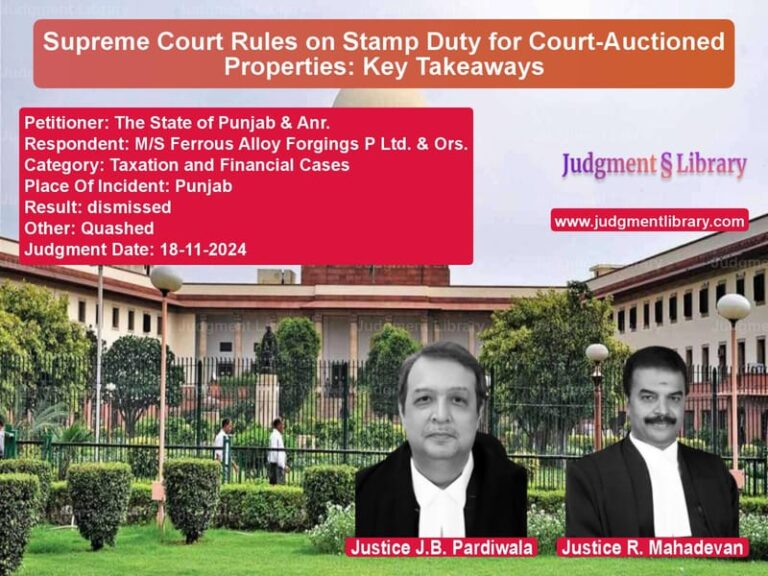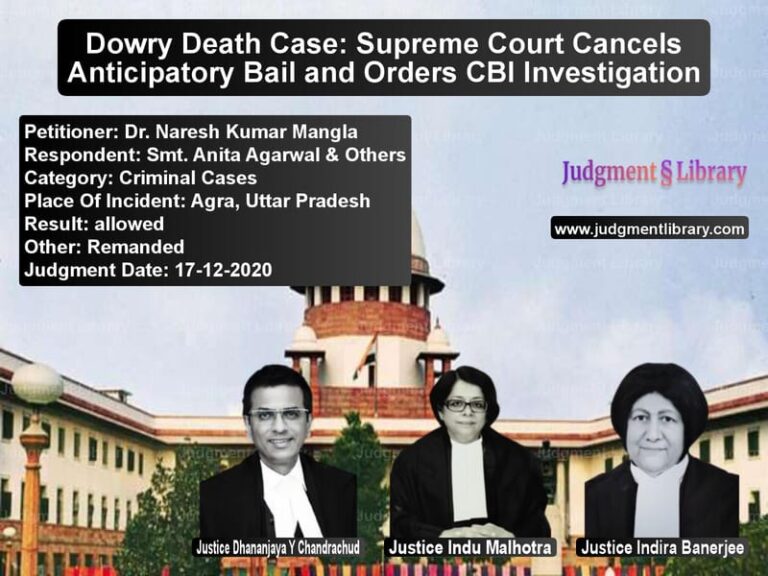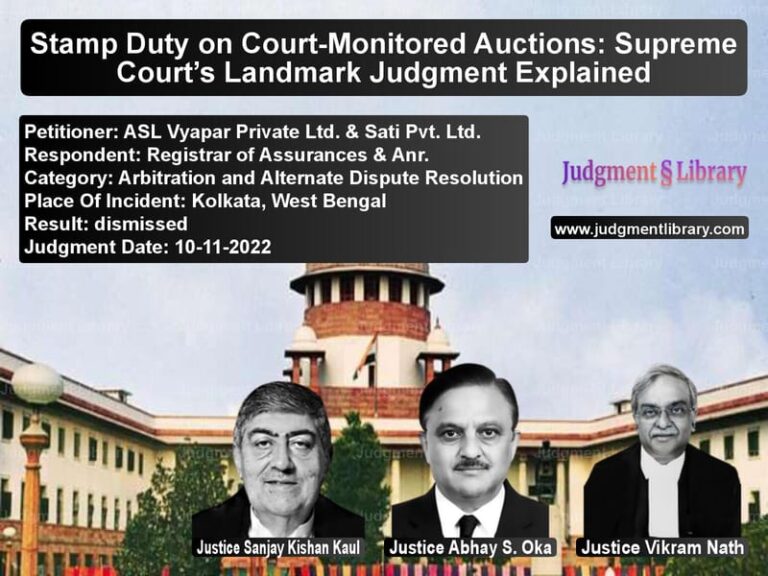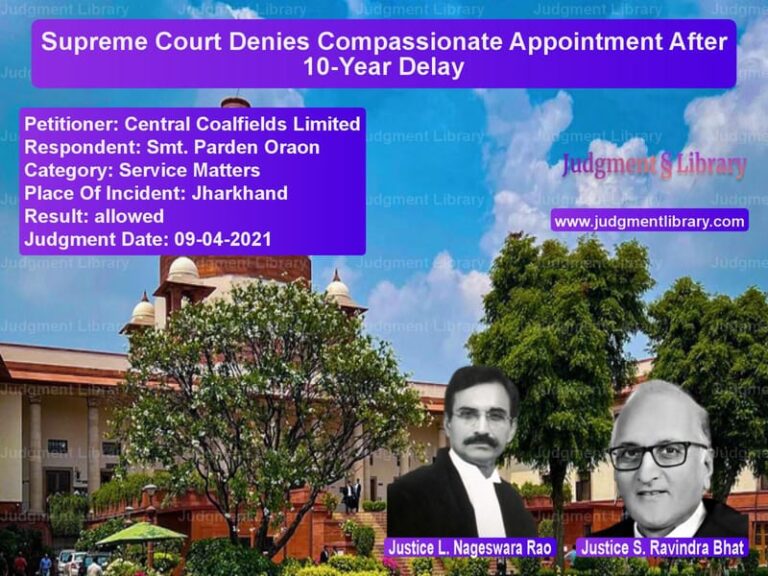Supreme Court Upholds Caste Claim: The Significance of Pre-Independence Documents in Koli Mahadev Tribe Case
In a significant ruling that underscores the importance of historical evidence in caste validity claims, the Supreme Court of India recently delivered a judgment that has profound implications for how such cases are adjudicated. The case involved a young medical aspirant, Yogesh Madhav Makalwad, whose dream of pursuing a medical education hinged on the validation of his caste certificate. The legal journey he undertook, from the local Scrutiny Committee to the highest court in the land, reveals much about how caste claims are evaluated and the weight given to different types of evidence.
The story begins in the family history of Yogesh Makalwad. His grandfather, Jalba Malba Makalwad, had his caste recorded as Koli Mahadev in school records dating back to 1943. This pre-Independence document became the cornerstone of Yogesh’s claim to belong to the Scheduled Tribe community of Koli Mahadev. Subsequent school records of his father and uncle from 1975 and 1979 also consistently showed their caste as Koli Mahadev. Yogesh’s own school records from 2005 continued this pattern, all pointing to a consistent family history of belonging to the Koli Mahadev tribe.
The crucial moment came when Yogesh appeared for the NEET UG examination and scored 334 marks out of 720, making him eligible for admission to a medical college under the reservation quota for Scheduled Tribes. However, his caste certificate had not been validated, prompting him to approach the Bombay High Court seeking directions for expedited scrutiny. During the pendency of this petition, the Scheduled Tribe Certificate Scrutiny Committee at Aurangabad invalidated his caste claim, leading to the cancellation of his caste certificate.
The Legal Battle
When the matter reached the Supreme Court, both sides presented their arguments with vigor. The appellant’s counsel, Shri Uday Bhaskar Dube, made a compelling case centered on the historical documents. He emphasized that “the School Admission and Leaving Extract of the appellant’s grandfather, which was recorded on 10th October, 1943 clearly indicates the caste as Koli Mahadev.” He argued that “the same being a pre-Independence document will have a greater probative value” and that both the Scrutiny Committee and High Court had erred in not giving this document due consideration.
On the other side, the respondent-State represented by Shri Shrirang B. Varma and Shri Varad Kilor, countered these arguments. They raised doubts about the authenticity of the 1943 document, stating that “the so-called document of 1943 is not free from doubt as the opinion on handwriting with regard to interpolation is inconclusive.” They further argued that “the appellant has failed the affinity test” and “has not been in a position to depose before the Scrutiny Committee with regard to the customs and traditions followed by the Koli Mahadev Tribe.”
The Supreme Court’s Analysis
The Supreme Court bench comprising Chief Justice B.R. Gavai and Justices Satish Chandra Sharma and K. Vinod Chandran delved deep into the legal principles governing caste claim verifications. The Court extensively referred to its earlier landmark judgment in Anand v. Committee for Scrutiny & Verification of Tribe Claims and Others, which laid down important parameters for evaluating such claims.
The Court emphasized the crucial distinction between pre-Independence and post-Independence documents, noting that “while dealing with documentary evidence, greater reliance may be placed on pre-Independence documents because they furnish a higher degree of probative value to the declaration of status of a caste, as compared to post-Independence documents.” This principle became particularly significant in Yogesh’s case, given that his grandfather’s school record predated India’s independence.
Regarding the specific document from 1943, the Court conducted its own examination and found that “the words Koli Mahadev written in the entry are in the same ink and in the same handwriting. Therefore, we find that there could be no scope for interpolation in the said entry.” This direct observation by the Court effectively countered the State’s arguments about possible tampering with the document.
Perhaps the most significant aspect of the judgment relates to the Court’s interpretation of the affinity test. The Court reiterated its position from the Anand case that “while applying the affinity test, which focuses on the ethnological connections with the Scheduled Tribe, a cautious approach has to be adopted.” The Court recognized the changing social realities, observing that “a few decades ago, when the tribes were somewhat immune to the cultural development happening around them, the affinity test could serve as a determinative factor. However, with the migrations, modernisation and contact with other communities, these communities tend to develop and adopt new traits which may not essentially match with the traditional characteristics of the tribe.”
The Court made it clear that “the affinity test may not be regarded as a litmus test for establishing the link of the applicant with a Scheduled Tribe.” It further elaborated that “the claim by an applicant that he is a part of a Scheduled Tribe and is entitled to the benefit extended to that tribe, cannot per se be disregarded on the ground that his present traits do not match his tribe’s peculiar anthropological and ethnological traits, deity, rituals, customs, mode of marriage, death ceremonies, method of burial of dead bodies, etc.”
The Court also referenced its recent three-judge bench decision in Maharashtra Adiwasi Thakur Jamat Swarakshan Samiti v. State of Maharashtra and Others, which had reiterated that “the affinity test cannot be conclusive either way” and that “the affinity test is not a litmus test to decide the caste claim and is not an essential part in the process of determination of correctness of a caste or tribe claim in every case.”
The Final Judgment
After considering all aspects of the case, the Supreme Court concluded that both the Scrutiny Committee and the High Court had erred in their approach. The Court held that the 1943 document pertaining to Yogesh’s grandfather deserved greater probative value and that the rejection of this document was based on “presumptions and assumptions” rather than concrete evidence.
The Court allowed the appeal, quashed the High Court’s judgment, and directed the Scrutiny Committee to issue a Caste Validity Certificate to Yogesh within six weeks, finally recognizing him as belonging to the Koli Mahadev Tribe.
Broader Implications
This judgment has significant implications for how caste claims are processed across India. By reaffirming the superior evidentiary value of pre-Independence documents and downplaying the importance of the affinity test in contemporary times, the Court has acknowledged the evolving nature of tribal identities and communities. The recognition that modernization and migration have changed how tribal communities practice their traditions reflects a more realistic understanding of social dynamics.
For thousands of students and job applicants whose prospects depend on caste validity certificates, this judgment provides crucial clarity on what evidence will be considered determinative. It emphasizes that historical family records, particularly those from the pre-Independence era, carry substantial weight in establishing caste status, while inability to recall specific tribal customs and traditions cannot be the sole ground for rejection of a genuine claim.
The judgment strikes a balance between preventing fraudulent claims and ensuring that genuine claimants are not denied their rights due to changing social patterns and fading memories of traditional practices. It represents a progressive interpretation of caste verification processes, one that respects historical evidence while acknowledging contemporary social realities.
Petitioner Name: Yogesh Madhav Makalwad.Respondent Name: The State of Maharashtra.Judgment By: Justice B.R. Gavai, Justice Satish Chandra Sharma, Justice K. Vinod Chandran.Place Of Incident: Nanded District, Maharashtra.Judgment Date: 12-08-2025.Result: allowed.
Don’t miss out on the full details! Download the complete judgment in PDF format below and gain valuable insights instantly!
Download Judgment: yogesh-madhav-makalw-vs-the-state-of-maharas-supreme-court-of-india-judgment-dated-12-08-2025.pdf
Directly Download Judgment: Directly download this Judgment
See all petitions in Reservation Cases
See all petitions in Education Related Cases
See all petitions in Judgment by B R Gavai
See all petitions in Judgment by Satish Chandra Sharma
See all petitions in Judgment by K. Vinod Chandran
See all petitions in allowed
See all petitions in Quashed
See all petitions in supreme court of India judgments August 2025
See all petitions in 2025 judgments
See all posts in Civil Cases Category
See all allowed petitions in Civil Cases Category
See all Dismissed petitions in Civil Cases Category
See all partially allowed petitions in Civil Cases Category

